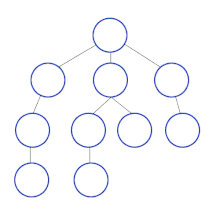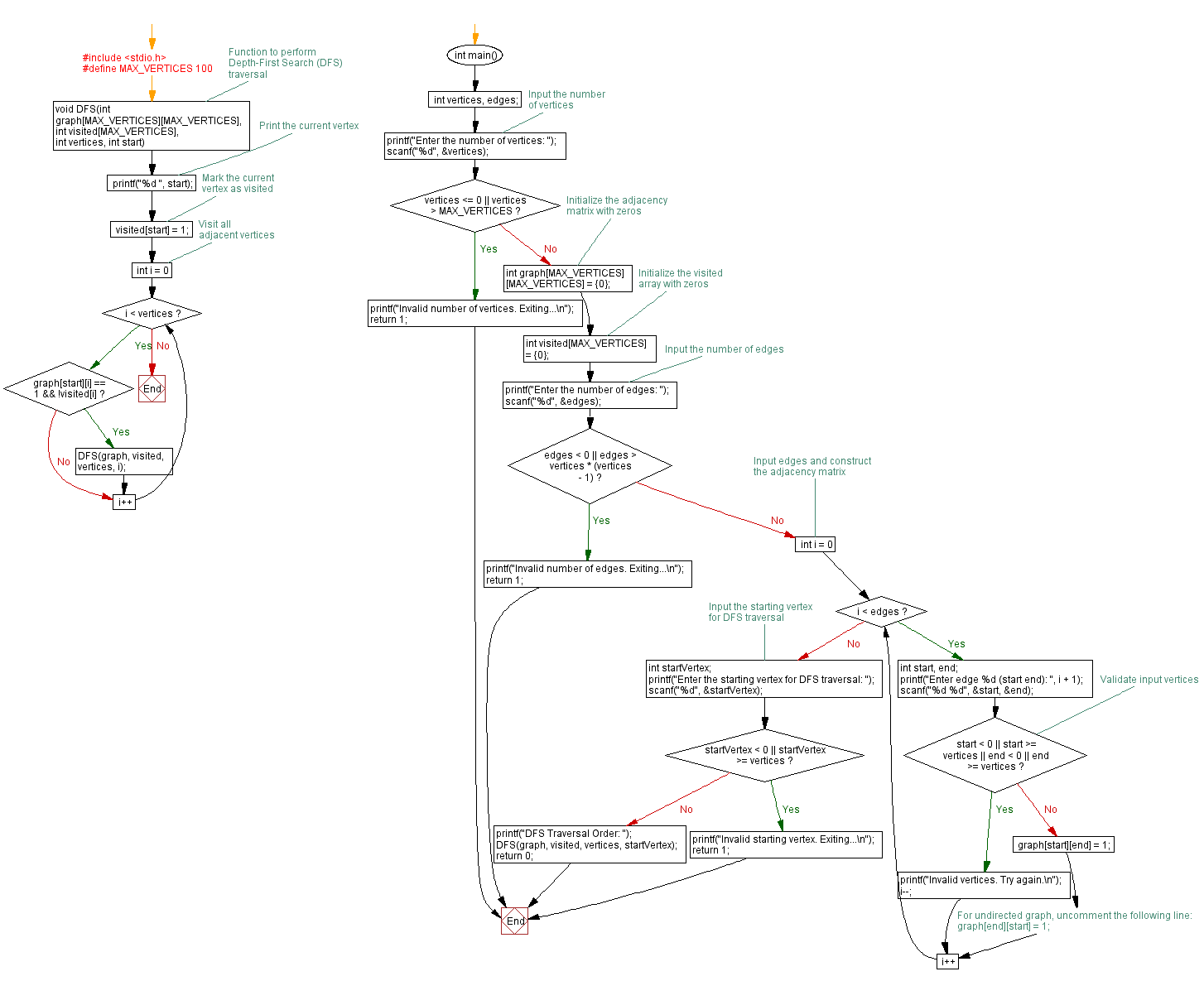Program for DFS traversal in Graph
4. Depth-First Search (DFS) Extended Challenges
Write a C program that implements DFS (Depth-First Search) traversal for a graph in C. Print the order of visited vertices.
From Wikipedia -
Depth-first search (DFS) is an algorithm for traversing or searching tree or graph data structures. The algorithm starts at the root node (selecting some arbitrary node as the root node in the case of a graph) and explores as far as possible along each branch before backtracking. Extra memory, usually a stack, is needed to keep track of the nodes discovered so far along a specified branch which helps in backtracking of the graph.
Animated example of a depth-first search:

Source: Wikipedia
Sample Solution:
C Code:
#include <stdio.h>
#define MAX_VERTICES 100
// Function to perform Depth-First Search (DFS) traversal
void DFS(int graph[MAX_VERTICES][MAX_VERTICES], int visited[MAX_VERTICES], int vertices, int start) {
printf("%d ", start); // Print the current vertex
visited[start] = 1; // Mark the current vertex as visited
// Visit all adjacent vertices
for (int i = 0; i < vertices; i++) {
if (graph[start][i] == 1 && !visited[i]) {
DFS(graph, visited, vertices, i);
}
}
}
int main() {
int vertices, edges;
// Input the number of vertices
printf("Enter the number of vertices: ");
scanf("%d", &vertices);
if (vertices <= 0 || vertices > MAX_VERTICES) {
printf("Invalid number of vertices. Exiting...\n");
return 1;
}
int graph[MAX_VERTICES][MAX_VERTICES] = {0}; // Initialize the adjacency matrix with zeros
int visited[MAX_VERTICES] = {0}; // Initialize the visited array with zeros
// Input the number of edges
printf("Enter the number of edges: ");
scanf("%d", &edges);
if (edges < 0 || edges > vertices * (vertices - 1)) {
printf("Invalid number of edges. Exiting...\n");
return 1;
}
// Input edges and construct the adjacency matrix
for (int i = 0; i < edges; i++) {
int start, end;
printf("Enter edge %d (start end): ", i + 1);
scanf("%d %d", &start, &end);
// Validate input vertices
if (start < 0 || start >= vertices || end < 0 || end >= vertices) {
printf("Invalid vertices. Try again.\n");
i--;
continue;
}
graph[start][end] = 1;
// For undirected graph, uncomment the following line:
// graph[end][start] = 1;
}
// Input the starting vertex for DFS traversal
int startVertex;
printf("Enter the starting vertex for DFS traversal: ");
scanf("%d", &startVertex);
if (startVertex < 0 || startVertex >= vertices) {
printf("Invalid starting vertex. Exiting...\n");
return 1;
}
printf("DFS Traversal Order: ");
DFS(graph, visited, vertices, startVertex);
return 0;
}
Output:
Enter the number of vertices: 5 Enter the number of edges: 6 Enter edge 1 (start end): 0 1 Enter edge 2 (start end): 1 2 Enter edge 3 (start end): 2 3 Enter edge 4 (start end): 3 4 Enter edge 5 (start end): 4 0 Enter edge 6 (start end): 2 4 Enter the starting vertex for DFS traversal: 2 DFS Traversal Order: 2 3 4 0 1
Explanation:
The above C exercises perform Depth-First Search (DFS) traversal on a graph represented by an adjacency matrix. Here's a brief explanation:
- DFS Function:
- The "DFS()" function takes the graph, an array to track visited vertices, the total number of vertices, and the starting vertex as parameters.
- It prints the current vertex, marks it as visited, and then recursively explores all unvisited adjacent vertices.
- Main Function:
- It takes user input for the number of vertices and edges.
- Constructs the adjacency matrix based on user input for edges.
- Takes the starting vertex for DFS traversal.
- Calls the "DFS()" function with the provided parameters.
- Outputs the DFS traversal order.
- User Input:
- The user is prompted to input the number of vertices and edges.
- For each edge, the user inputs the starting and ending vertices.
- Output:
- The program outputs the DFS traversal order starting at the specified vertex.
Flowchart:

For more Practice: Solve these Related Problems:
- Write a C program to implement recursive DFS on a graph represented by an adjacency matrix and output discovery/finishing times.
- Write a C program to perform DFS iteratively using a stack and print the order of visited vertices.
- Write a C program to modify DFS to track the path from the source to each vertex and print complete traversal paths.
- Write a C program to implement DFS that detects cycles by identifying back edges during traversal.
Go to:
PREV : Directed Edge Insertion Challenges.
NEXT : Breadth-First Search (BFS) Extended Challenges.
C Programming Code Editor:
Have another way to solve this solution? Contribute your code (and comments) through Disqus.
What is the difficulty level of this exercise?
Test your Programming skills with w3resource's quiz.
